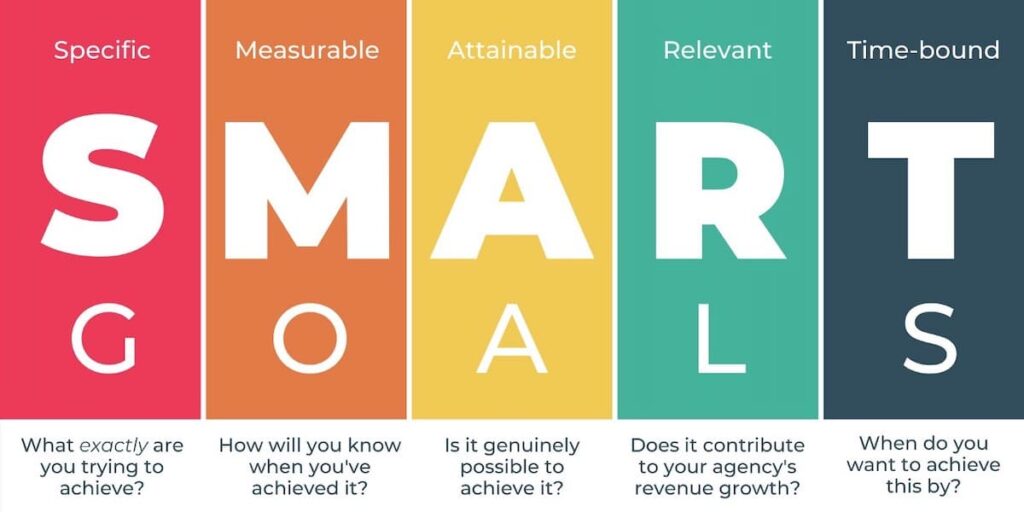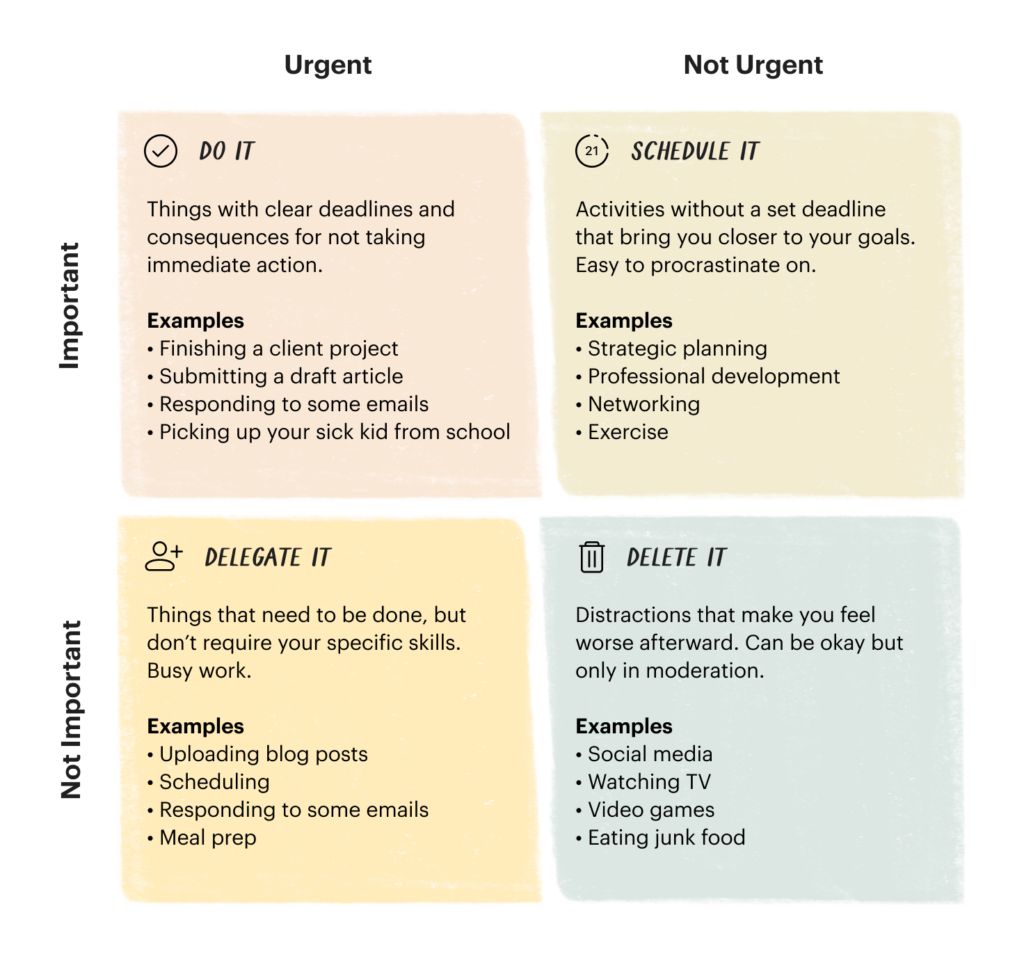Ever wondered how high performers appear to have 48 hours in a day while you’re stuck with the typical 24? They seem to attend meetings, finish projects, answer emails, and still have time for family, self-care, and that 5K morning run. It is like they’ve found a secret passage in the fabric of time, hidden from the rest of us.
But what if we told you that their secret is not time travel but simple and effective time management skills? It is their mastery of time management, the art and science of using each moment to its maximum potential. They aren’t doing more things, but doing the right things at the right time.
Eager to unlock the high performer in you? Let’s uncover the 11 time management principles that professional superstars swear by. Prepare to rewrite your story and transform from busy to productive!


#1: Set clear goals and objectives, and develop a plan to achieve them
At the heart of every high performer’s success lies a crystal clear goal. Having a well-defined objective not only sets the direction but also focuses attention on where it matters most.
High performers have mastered the art of setting SMART goals — Specific, Measurable, Attainable, Relevant, and Time-Bound.
Developing a plan to achieve these goals is just as vital. This is where effective time management tools and strategies come into play.
This organised approach eliminates guesswork and provides a clear roadmap to success, ensuring that progress is made in the right direction, one step at a time.
#2: Stay organised and have a well-defined system for managing your time
Think about the world’s most successful businesses. What do they all have in common? A well-defined system.
Organisation is key here. It involves structuring your workday, identifying your priorities, and sticking to a consistent routine. It is not just about arranging tasks; it’s about consolidating your tasks, meetings, and even downtime.


Keep in mind that organisation doesn’t mean inflexibility. It is not about rigidly adhering to a schedule but dynamically adjusting to shifting priorities and unexpected tasks.
This balance between organisation and flexibility is how high performers turn chaos into order, maximising their productivity.
#3: Use a combination of methods to manage your time
High performers don’t just stick to one method of time management. They combine a variety of strategies to optimise their productivity.
Using to-do lists helps to consolidate and prioritise tasks, providing a clear overview of what needs to be achieved. Calendars offer a visual representation of your schedule, allowing for effective planning and allocation of time for tasks, meetings, and personal activities.


Task management apps are another indispensable tool. These digital platforms enable high performers to break down projects into manageable tasks, set deadlines, and track progress.
The key here is to understand that different tools serve different purposes, and combining these methods can create a comprehensive, personalised system for time management.
#4: Delegate tasks to others to free up time for more important tasks
High performers understand the power of delegation. They recognise that time is a finite resource and that it’s impossible for one person to do everything.
Effective delegation isn’t about offloading work onto others. It is a strategic decision. It involves identifying tasks that can be accomplished by someone else without compromising the results.


This might include administrative duties, routine operations, or tasks that others are simply better equipped to handle.
Delegation also offers the dual benefits of fostering trust and building capabilities within a team. It is a win-win approach to time management and team development!
#5: Prioritise tasks efficiently and effectively to maximise your productivity
One of the secrets to high performers’ productivity is effective prioritisation. They understand that not every task is created equal and that the key to success isn’t doing more things, but doing the right things at the right time.
Prioritisation involves ranking tasks based on their importance and urgency, often using methods like the Eisenhower Matrix.


They also recognise the importance of saying “no” to less critical tasks or distractions that don’t contribute to their objectives. This helps them avoid spreading themselves too thin, so they can stay focused on achieving their goals.
By prioritising efficiently, you can get the most out of your time, ensuring that each moment counts towards your success.
#6: Use time-blocking techniques to break down tasks into more manageable chunks
Time-blocking is a tried and tested technique to streamline your workday. It involves segmenting the day into blocks of time, each dedicated to a specific task or activity.
By breaking down tasks into manageable chunks and scheduling them, you can focus your attention and energy more efficiently. This method helps to prevent the productivity drain of multitasking, which leads to diminished focus and poor quality of work.


What’s more, this technique ensures that important tasks are not left to chance. They have a dedicated slot in the schedule, reducing the risk of being overlooked.
By using time-blocking techniques, you can take control of your workday, promoting productivity and mitigating the stress of overwhelming to-do lists.
#7: Use time-tracking tools to measure progress and identify areas for improvement
High performers don’t just manage their time, they analyse it using time-tracking tools. This gives them a detailed view of their time, providing valuable insights.
Time tracking can reveal habits and patterns that impact productivity, such as prolonged periods spent on low-priority tasks or common distractions that interrupt the workflow. It also helps measure progress towards goals, showing where time is well spent and where adjustments are needed.
![]()
![]()
These tools can also help improve estimations for task durations, aiding in better planning and scheduling down the line.
By tracking their time, high performers cultivate an awareness of their productivity patterns, leading to continuous improvement and the efficient utilisation of their most precious resource — time.
#8: Set deadlines to ensure that tasks are completed on time
Deadlines act as a powerful motivator and a practical tool, pushing you to complete tasks within a specified timeframe and providing a tangible end point for projects.
Setting deadlines helps to structure your workflow and keep procrastination at bay. It encourages focus, fosters a healthy sense of urgency, and promotes progress, preventing tasks from dragging on indefinitely.


However, effective deadline setting isn’t about creating stress. Instead, it’s about setting realistic and achievable targets that inspire action, all while considering other commitments and breaks to avoid burnout.
By setting and adhering to deadlines, high performers ensure their tasks are completed on time, propelling them towards their goals.
#9: Use rewards and incentives to motivate yourself to stay on track with your goals
Motivation plays a vital role in maintaining productivity, and high performers are no strangers to this. They often use rewards and incentives as tools to reinforce positive behaviour.
This isn’t about grand rewards — the value lies in the act of recognition. Something as simple as a walk in the park, a favourite snack, or a short break to read can be incredibly effective. These rewards act as a form of self-recognition for completing tasks or achieving milestones.


Positive reinforcement can make achieving goals more enjoyable, leading to a sustainable productivity routine rather than one driven by stress.
By rewarding themselves, high performers stay motivated, fostering a positive relationship with their work and goals.
#10: Set boundaries and know when to say NO
High performers understand the importance of boundaries in maintaining productivity and a healthy work–life balance.
This involves setting clear boundaries around their work times, rest periods, and personal life. It might mean turning off work emails after a certain hour, not taking work calls during family time, and scheduling regular breaks during the workday.


A crucial part of setting boundaries is the ability to say “no”. High performers aren’t afraid to decline requests or opportunities that don’t align with their goals or values or that could overload their schedule.
By setting firm boundaries, high performers respect their time, sustain their energy, and stay on track towards their objectives.
#11: Perform a regular self-reflection practice
Self-reflection is a critical part of personal growth and sustained productivity. That’s why high performers regularly take time to pause, review their actions, and assess their progress.
This isn’t merely about tracking accomplishments. It is about understanding work patterns, identifying what worked well and what didn’t, and recognising areas for improvement.


Self-reflection can take various forms, from journaling to mindfulness meditation or simply sitting in silence for a few minutes at the end of the day. What matters most is the consistent practice of introspection and learning.
Through self-reflection, high performers keep their performance, goals, and strategies under continuous review, driving personal growth and enhancing productivity.
Mastering time management for high performance
By integrating these principles into your life, you can join the ranks of high performers who master their time to maximise productivity.
Remember, effective time management isn’t just about working hard but working smart. These principles are not quick fixes but habits that, when consistently practised, can transform your professional and personal life.
If you want to develop strong time management skills, consider taking a time management course. For the last 40 years, Priority Management has offered expert time management courses for all audiences, from individual professionals to large enterprise teams.
In fact, our courses are proven to have saved past students 54 minutes per working day!
Our instructors tailor our training to suit your specific industry, goals, and assignments to help you reach project requirements and achieve high-quality outcomes. If you’re ready to get started, or you have any questions, reach out to us today!
